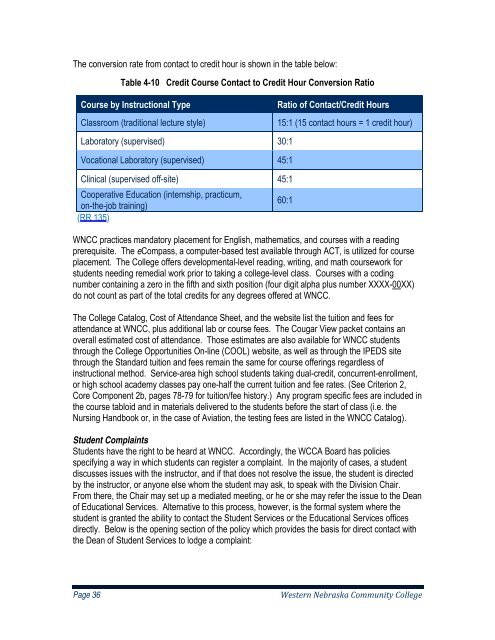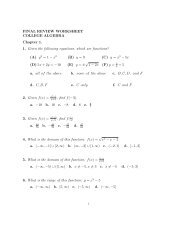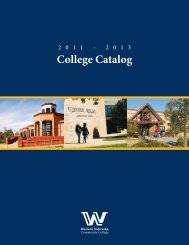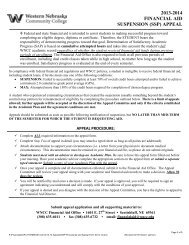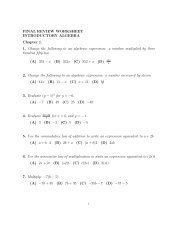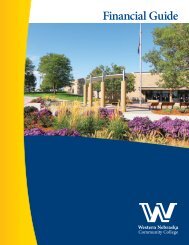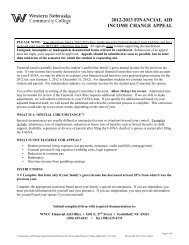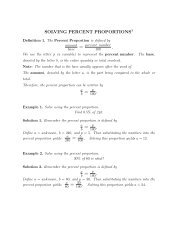WNCC 2010 Self-Study Report - Western Nebraska Community ...
WNCC 2010 Self-Study Report - Western Nebraska Community ...
WNCC 2010 Self-Study Report - Western Nebraska Community ...
You also want an ePaper? Increase the reach of your titles
YUMPU automatically turns print PDFs into web optimized ePapers that Google loves.
The conversion rate from contact to credit hour is shown in the table below:<br />
Table 4-10 Credit Course Contact to Credit Hour Conversion Ratio<br />
Course by Instructional Type<br />
Classroom (traditional lecture style)<br />
Ratio of Contact/Credit Hours<br />
15:1 (15 contact hours = 1 credit hour)<br />
Laboratory (supervised) 30:1<br />
Vocational Laboratory (supervised) 45:1<br />
Clinical (supervised off-site) 45:1<br />
Cooperative Education (internship, practicum,<br />
on-the-job training)<br />
(RR 135)<br />
<strong>WNCC</strong> practices mandatory placement for English, mathematics, and courses with a reading<br />
prerequisite. The eCompass, a computer-based test available through ACT, is utilized for course<br />
placement. The College offers developmental-level reading, writing, and math coursework for<br />
students needing remedial work prior to taking a college-level class. Courses with a coding<br />
number containing a zero in the fifth and sixth position (four digit alpha plus number XXXX-00XX)<br />
do not count as part of the total credits for any degrees offered at <strong>WNCC</strong>.<br />
The College Catalog, Cost of Attendance Sheet, and the website list the tuition and fees for<br />
attendance at <strong>WNCC</strong>, plus additional lab or course fees. The Cougar View packet contains an<br />
overall estimated cost of attendance. Those estimates are also available for <strong>WNCC</strong> students<br />
through the College Opportunities On-line (COOL) website, as well as through the IPEDS site<br />
through the Standard tuition and fees remain the same for course offerings regardless of<br />
instructional method. Service-area high school students taking dual-credit, concurrent-enrollment,<br />
or high school academy classes pay one-half the current tuition and fee rates. (See Criterion 2,<br />
Core Component 2b, pages 78-79 for tuition/fee history.) Any program specific fees are included in<br />
the course tabloid and in materials delivered to the students before the start of class (i.e. the<br />
Nursing Handbook or, in the case of Aviation, the testing fees are listed in the <strong>WNCC</strong> Catalog).<br />
Student Complaints<br />
Students have the right to be heard at <strong>WNCC</strong>. Accordingly, the WCCA Board has policies<br />
specifying a way in which students can register a complaint. In the majority of cases, a student<br />
discusses issues with the instructor, and if that does not resolve the issue, the student is directed<br />
by the instructor, or anyone else whom the student may ask, to speak with the Division Chair.<br />
From there, the Chair may set up a mediated meeting, or he or she may refer the issue to the Dean<br />
of Educational Services. Alternative to this process, however, is the formal system where the<br />
student is granted the ability to contact the Student Services or the Educational Services offices<br />
directly. Below is the opening section of the policy which provides the basis for direct contact with<br />
the Dean of Student Services to lodge a complaint:<br />
60:1<br />
Page 36<br />
<strong>Western</strong> <strong>Nebraska</strong> <strong>Community</strong> College


